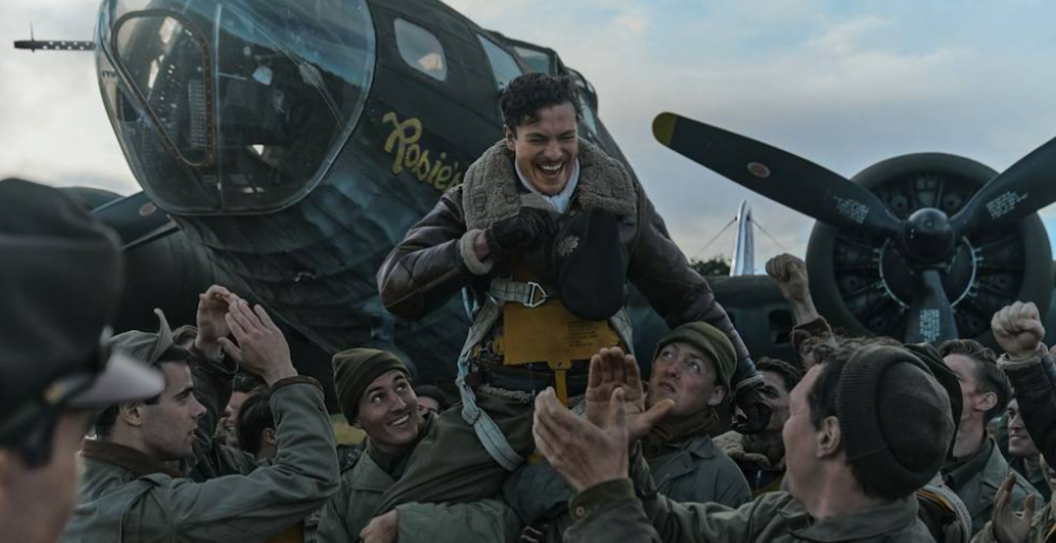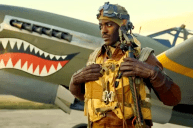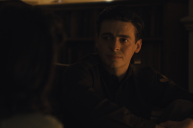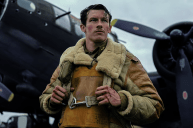By Episode 7, "Masters of the Air" has seen the bomber boys of the Bloody Hundredth scattered across Europe. And the storylines are just as dispersed. The series has continued to follow through on some of these plots. Others, as the latest episode reveals, have been glossed over entirely, hastily wrapped up despite the groundwork being laid for what had appeared to be significant narratives. While I appreciate how writer John Orloff ("Band of Brothers," "Legend of the Guardians: The Owls of Ga'Hoole") has paid homage to as many of the brave souls involved in this conflict as possible, these frayed threads make parts of "Masters" feel a bit scattered, rushed and incomplete. Luckily, a new documentary will premiere after the finale episode and provide more insight into the real heroes featured in the series.
Covering the Odyssey of the Hundredth is no small task. Orloff's script for "Band of Brothers" — a companion series to "Masters" — followed the paratroopers of Easy Company as they dropped into Europe and trekked their way to Hitler's doorstep together. But the Bomber Boys are all over the place. Some are at the airbase in England. Others slink along underground escape routes through German-occupied territory. Others are trapped in a POW camp. To call it a juggling act is to put it lightly. And this act was exacerbated by numerous Covid-related production delays and an already gargantuan budget, which included literally building its own airbase in Europe — estimates put the bill at around $250 million.
Nevertheless, the triumphs and tragedies of "Masters" have never ceased to thrill. And Orloff's pen continues with admirable gusto in the latest entry. Part 7 sees Harry Crosby (Anthony Boyle) and the men at Thorpe Abbots endure the devastating "Black Monday." Meanwhile, Major Gale "Buck" Cleven (Austin Butler) and Major John "Bucky" Egan (Callum Turner) hope to survive the increasingly hostile conditions of the German POW camp, Stalag Luft III.
Keep going for our full analysis of "Masters of the Air" Episode 7.
Warning: spoilers ahead for 'Masters of the Air' Part 7.
The Stalag Luft III Radio Hour
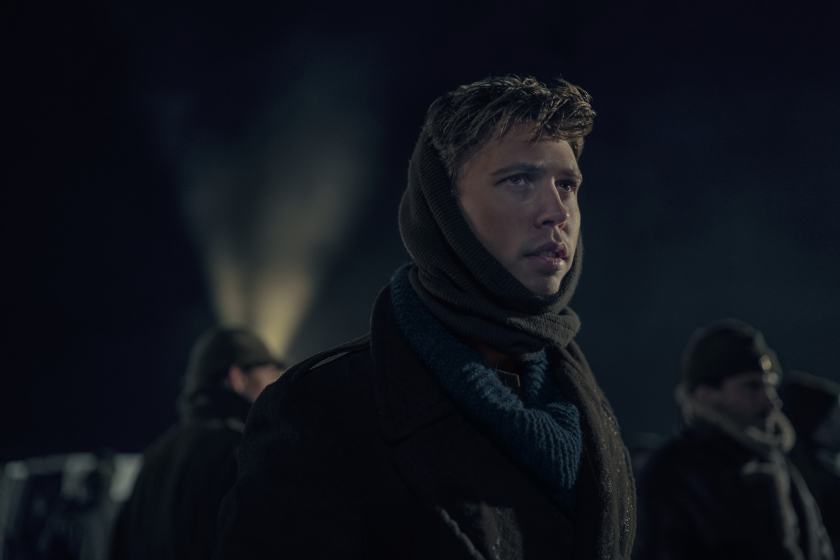
AppleTV+
Part 7 opens with Crosby narrating the situation at Stalag Luft III. He does a lot of voiceover work in this episode. Probably more than any of the previous chapters. I enjoy the added historical context, but it's as if he's dumping as much info onto us as possible to try and cram it all in before the Episode 9 finale. It feels like the showrunners had more story they wanted to tell but ran out of runway. "Masters" may have benefited from making the series into an even 10 episodes, and I can't help but wonder if those aforementioned Covid and budget concerns played a part in this rushed feeling.
Anyway, Crosby explains that the men imprisoned at Stalag Luft III are cold and miserable but that they're treated humanely enough. This is not a concentration camp. We also have a whole bunch of Nazis in Allied POW camps, so the Germans have an incentive not to torture the prisoners outright. They get food, water, shelter, individual bunks, music and books. However, what Cros is telling us doesn't quite match the reality we're seeing.
The Red Cross parcels are delayed. So the men have resorted to catching stray cats for protein (one airman loses his lunch when he discovers what he's eating). While some chicken soup would be nice, what the men really crave is news from the front. They know the war is over for them. But they don't know how long they'll have to wait until Hitler surrenders and they can go home.
The airmen secretly tap an English broadcast through a makeshift radio device, which they hide in a table leg. Cleven listens through a headphone and relays the latest war news to the other guys, who jot it down on scraps of paper and pass the messages along to the brass, also imprisoned.
Unfortunately, the news from the front is all bad. And to make matters worse, their table leg radio is discovered during a random search. Cleven made a crystal radio as a kid and thinks he can fashion one in Stalag Luft III — if they can scrounge up the right materials.
'Black Monday'
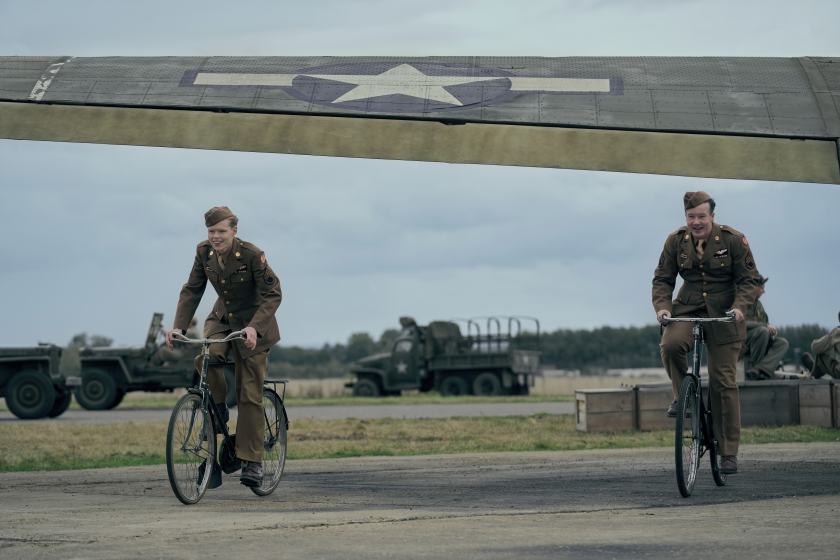
AppleTV+
Meanwhile, at Thorpe Abbots, William Quinn (Kai Alexander) and Charles Bailey (Bailey Brook) ride their bicycles across the tarmac, all smiles. They've made it back to England after a harrowing escape from German-occupied territory. Better yet, Cros explains that since they're familiar with the Belgian and French resistance fighters' underground routes, their war is over. If they were to be shot down again and interrogated by the Gestapo, they could spill the beans on the whole resistance network. They're going home.
It's disappointing that Quinn and Bailey's story ends so abruptly. Last we saw the downed airmen — way back in Episode 4 — it seemed their treacherous journey back to England had only just begun. And I would have loved to see more of the compelling characters in the resistance movement — namely, the two young women who had a knack for covert ops and had saved their skins on multiple occasions.
The brass order the airmen to ramp up the bombing raids — again — as the Allies prep for a full-scale invasion of Germany. As they go deeper into German territory, striking Hitler's home base of Berlin, the missions grow more costly. Black Monday, as it came to be called, sees the men of the Hundredth torn to shreds. 15 bombers went down — that's 150 men. And since so many casualties have been sustained, most of the airmen are brand new. They're shot down on their first mission.
We don't see the carnage in the air. But we see the planes come limping back to base afterward, trailing thick plumes of smoke. There's a brutal montage of men being pulled charred and screaming from the ravaged metal husks. One has been scalped. Another has a bone jutting from his mangled leg.
Needless to say, morale is at an all-time low. And Crosby admits in his narration that he's begun cheating on his wife with Sandra, his British roommate from his time at the Flak Castle. There's something mysterious about Sandra. She's charming and funny. But when they first met in Episode 6, she was evasive about what she did. In this episode, when Crosby asks what she's been up to the past few weeks, she changes the subject to what she'll be doing 20 minutes from now (wink wink). There was a constant will-they-won't-they tension between them throughout Episode 6, so this seems inevitable.
Robert "Rosie" Rosenthal (Nate Mann) closes in on 25 missions — the number an airman needs before he goes home. He's also seen as a hero among the newbies after the Münster raid from Episode 5, where he was the only man from the Hundredth to return to base. Crosby's tour will take much longer. Now that he's in operations, he works behind a desk for most missions and flies far less frequently.
But getting to 25 won't be easy as they fly deeper into Germany. Pilot Dave Miner went down on number 25. His cockpit exploded — no chance he survived — and the men who parachuted out were shot by the Luftwaffe.
Just two days after Black Monday, they go up again. The Hundredth only has 15 planes that can fly — the same number shot down two days ago. As a swarm of German fighters loom, it looks like Rosie will be downed on number 25, too. But the bombers have a new fighter to escort them — the P-51 Mustang, the best plane of the war. Unlike previous escort planes, which needed to turn back to refuel, the P-51 can accompany the bombers for the duration of the raid. The Mustangs make quick work of the Luftwaffe and punch Rosie through to his target. He returns safely to base safely, buzzing the tower before he lands. He's carried from his plane as the men chant, "Rosie! Rosie! Rosie!"
It seems like this is the end of Rosie's story. But when the brass informs everyone else that their "magic number" has been upped to 28 (30 for the men arriving next week) Rosie decides to re-up. Colonel Bennett informs him that from here on, their main goal will be to shoot down the Luftwaffe with their fancy new Mustangs. But to do that, we need to lure them out using the bombers. Essentially, the Hundredth will be used as bait.
Undeterred, Rosie restarts his mission count. An unfathomably heroic move. Bennett promotes him to Commanding Officer of the 350th.
'There Are Only Americans in Stalag Luft III'
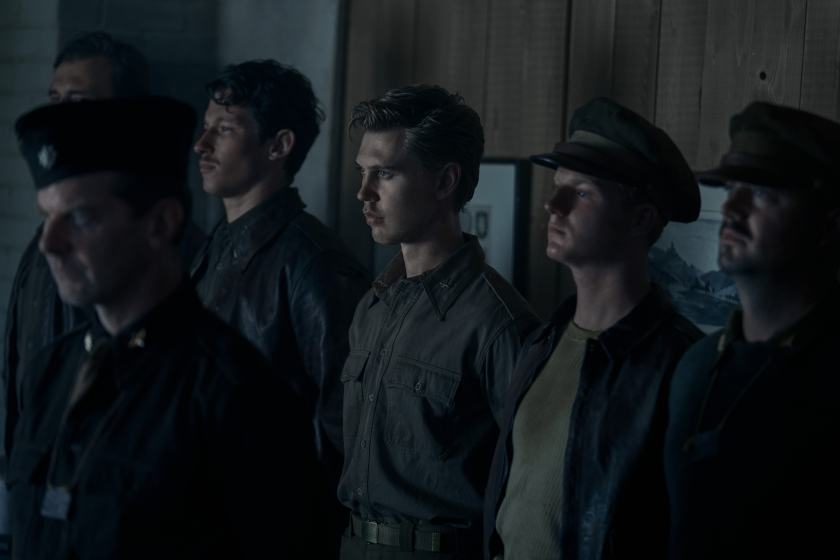
AppleTV+
Back in Stalag Luft III, the Nazi guards become less hospitable as the Allies close in on Berlin. They ask one prisoner about his Jewish name, but he shuffles off in a crowd before anything happens. Another prisoner, Harry, is shot in the gut as the men take cover during a nearby Allied air raid. The guard insists this was because Harry had tread too closely to the perimeter, but the airmen know the truth: the Nazis are growing more frustrated, anxious and spiteful as the war turns in favor of the Allies. In the ensuing commotion, another prisoner is mauled by a German Shepherd.
One night, as the men snooze, Cleven tells Egan he proposed to Marge (Isabel May), his stateside sweetheart, by letter. She replied yes. Would Egan be his best man? Of course, he would.
Right on the heels of that good news comes the bad. Cleven's new radio doesn't work. And as the guards' hostility increases, their chances of getting out alive grow slimmer.
After another cutaway to Thorpe Abbotts — there's a lot of jumping around in this episode — Cleven's radio is now working. They tune in just in time to hear that the Russians are closing in on the Eastern front, and the Allies have mounted successful air raids on Berlin. The brass strolls in to inform them that 70 to 80 Brits in the north compound have escaped by digging deep underground tunnels. The men rejoice, but this means they can expect the guards to crack down even harder.
Egan shares a heartfelt moment with Cleven. He bemoans that he hasn't received any letters from back home. He wishes he'd forged better relationships before the war had started and feels lonely. Cleven tells him there will be plenty of time for that when they get out. Egan says they'll only get the traumatized, war-stricken version of him, but Cleven reassures him that this version will be "worth knowing." Throughout the series, Turner has done a wonderful job of showing Egan struggle to maintain a macho facade while he breaks on the inside, and this moment of vulnerability is no exception.
Later, the airmen are called to a meeting with the German Major Simoleit. He tells them that all but a couple of the British escapees have been captured — 50 of them have been executed (side note: this event is covered in the 1963 movie, "The Great Escape"). If the Americans attempt to escape, they can expect a similar fate. He then asks if there are any Jewish POWs among their ranks, to which the brass replies, quite heroically: "There are only Americans in Stalag Luft III, Major Simoleit. Only Americans." Chills.
